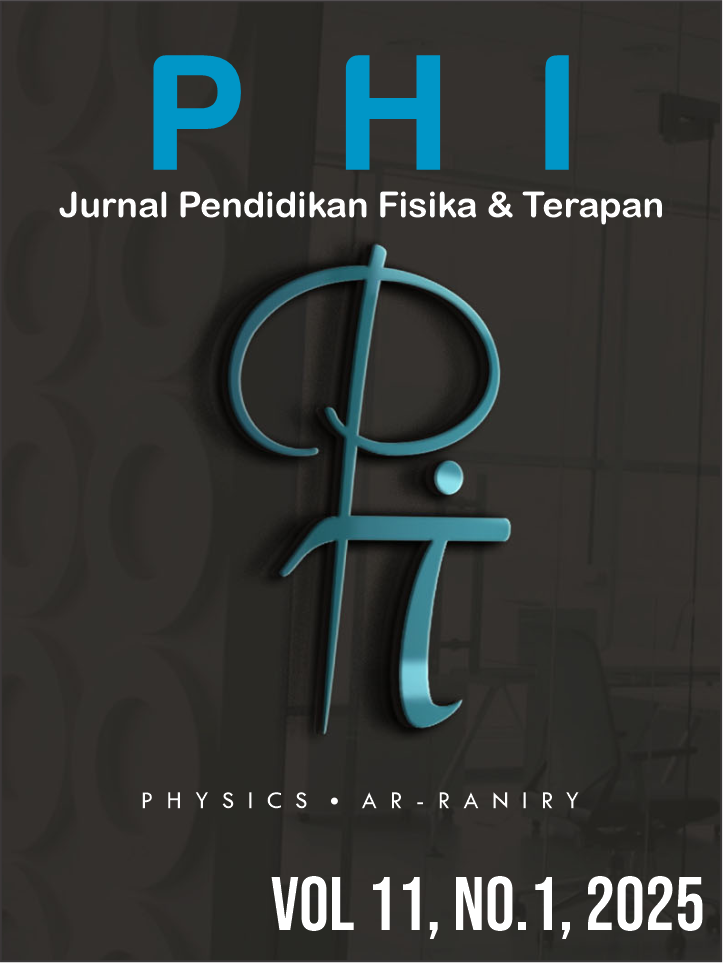Utilization of the Physics Laboratory to Increase Student Motivation and Learning Outcomes
DOI:
https://doi.org/10.22373/p-jpft.v11i1.28379Keywords:
Physics Laboratory, Learning Motivation, Learning Outcome,Abstract
The minimal use of laboratory facilities by teachers means that physics learning is only carried out in the classroom. This research aims to (1) determine the use of laboratories, motivation and learning outcomes of students at SMA Negeri 6 Wangi-Wangi, (2) determine the effect of use of laboratories on learning motivation, and (3) determine the effect of use of laboratories on learning outcomes. This research was carried out using an experimental research design. This research data was taken using multiple choice questions which were then given to class XI students. The results of the research show that (1) the use of laboratories at SMA Negeri 6 Wangi-Wangi is not optimal, students have never studied in a laboratory, so their motivation and learning outcomes in physics have not reached the KKM, (2) after learning in the laboratory, the average learning motivation increased from 68.72 to 81.3, and (3) there was no difference in learning outcomes before learning in the laboratory (tcount = 2.34 < ttable = 1.72), but learning outcomes increased significantly after treatment (tcount = -35.70 < ttable = 1.72). Based on this, it can be concluded that learning in the laboratory increases students' motivation and physics learning outcomes.References
Asma, A. (2021). Penerapan Metode Demonstrasi Untuk Meningkatkan Hasil Belajar Pendidikan Agama Islam Pada Siswa Kelas X Di SMK Negeri 2 Paguyaman. Aksara: Jurnal Ilmu Pendidikan Nonformal, 7(3), 1135. https://doi.org/10.37905/aksara.7.3.1135-1142.2021
Darojat, A. (2022). Studi Literatur Efektivitas Penggunaan Virtual Laboratory Dalam Pembelajaran Kimia Secara Luring. INCARE, International Journal of Educational Resources, 3(3), 359–364. https://doi.org/10.59689/incare.v3i3.494
Emda, A. (2017). Laboratorium Sebagai Sarana Pembelajaran Kimia Dalam Meningkatkan Pengetahuan Dan Ketrampilan Kerja Ilmiah. Lantanida Journal, 5(1), 83. https://doi.org/10.22373/lj.v5i1.2061
Endayani, T., Rina, C., & Agustina, M. (2020). Metode Demonstrasi Untuk Meningkatkan Hasil Belajar Siswa. Al - Azkiya : Jurnal Ilmiah Pendidikan MI/SD, 5(2), 150–158. https://doi.org/10.32505/al-azkiya.v5i2.2155
Gani, M. A., Tumewu, W. A., & Wola, B. R. (2022). Motivasi Belajar Siswa Kelas VII SMP Anugerah Tondano pada Pembelajaran IPA di Era Pandemi Covid-19. SCIENING : Science Learning Journal, 3(1), 8–13. https://doi.org/10.53682/slj.v3i1.1845
Hermana, D., Subekti, H., & Sabtiawan, W. B. (2022). Implementasi Laboratorium Virtual Untuk Meningkatkan Motivasi Belajar Dan Keterampilan Proses Sains Siswa SMP Dalam Pembelajaran IPA. Pense E-Jurnal : Pendidikan Sains, 10(2).
Hidayat, W., Sukri, A., & Mirawati, B. (2023). Efektivitas Penggunaan Laboratorium IPA Terhadap Pembelajaran Biologi. Empiricism Journal, 4(1), 163–174. https://doi.org/10.36312/ej.v4i1.1126
Langngan, V. B., Tulandi, D. A., & Mandang, T. (2021). Efektivitas Laboratorium Virtual Sebagai Media Pembelajaran Pada Eksperimen Viskositas. Charm Sains: Jurnal Pendidikan Fisika, 2(2), 88–93. https://doi.org/10.53682/charmsains.v2i2.112
Lubis, S. P. W., & Rizkika, D. (2017). Efektivitas penggunaan laboratorium dalam pembelajaran biologi kelas X di SMA Negeri 1 Unggul Baitussalam. Semdi Unaya Journal, 1(November), 418–428.
Mataputun, Y. (2020). Analisis pemenuhan standar nasional pendidikan dan permasalahannya. Jurnal Konseling Dan Pendidikan, 8(3), 224. https://doi.org/10.29210/148800
Rondonuwu, S. N. N. D., Sumayku, J., & Takaredase, A. (2022). Penerapan Metode Pembelajaran Demonstrasi Untuk Meningkatkan Hasil Belajar Animasi 2D pada Siswa SMK. Edutik : Jurnal Pendidikan Teknologi Informasi Dan Komunikasi, 2(2), 205–211. https://doi.org/10.53682/edutik.v2i2.4553
Sahempa, S., Togas, P. V., & Palilingan, V. R. (2021). Penerapan Model Pembelajaran Demonstrasi Untuk Meningkatkan Hasil Belajar Komputer Dan Jaringan Dasar Siswa Kelas X Tkj Smk Muhammadiyah Naha. Edutik : Jurnal Pendidikan Teknologi Informasi Dan Komunikasi, 1(1), 1–12. https://doi.org/10.53682/edutik.v1i1.922
Sarjono. (2018). Pentingnya Laboratorium Fisika di SMA/MA dalam Menunjang Pembelajaran Fisika. Jurnal Madaniyah, 8(3), 262–271.
Setiawati, E., Sopyan, T., & Maladona, A. (2021). Analisis Pengelolaan Laboratorium Ipa Dan Alternatif Praktikum Ipa Pada Masa Pandemi Covid-19 Di Smp Negeri 1 Ciamis. J-KIP (Jurnal Keguruan Dan Ilmu Pendidikan), 2(3), 229. https://doi.org/10.25157/j-kip.v2i3.6290
Sinta, I. M. (2019). Manajemen Sarana dan Prasarana Sekolah. Jurnal Isema : Islamic Educational Management, 4(1), 77–92. https://doi.org/10.15575/isema.v4i1.5645
Sugiyono. (2019). Metode Penelitian Pendidikan Pendekatan Kuantitaif, Kualitatif dan R&D. In Bandung: CV Alfabeta.
Yustikia, N. W. S. (2019). Pentingnya Sarana Pendidikan Dalam Menunjang Kualitas Pendidikan Di Sekolah. Guna Widya: Jurnal Pendidikan Hindu, 4(2), 1. https://doi.org/10.25078/gw.v4i2.1053
Downloads
Published
Issue
Section
License
Authors who publish with Jurnal Phi agree to the following terms:
- Authors retain copyright and grant the journal right of first publication with the work simultaneously licensed under a Creative Commons Attribution License (CC BY 4.0) that allows others to share the work with an acknowledgment of the work's authorship and initial publication in this journal.
- Authors are able to enter into separate, additional contractual arrangements for the non-exclusive distribution of the journal's published version of the work (e.g., post it to an institutional repository or publish it in a book), with an acknowledgment of its initial publication in this journal.
- Authors are permitted and encouraged to post their work online (e.g., in institutional repositories or on their website) prior to and during the submission process, as it can lead to productive exchanges, as well as earlier and greater citation of published work (See The Effect of Open Access).

















